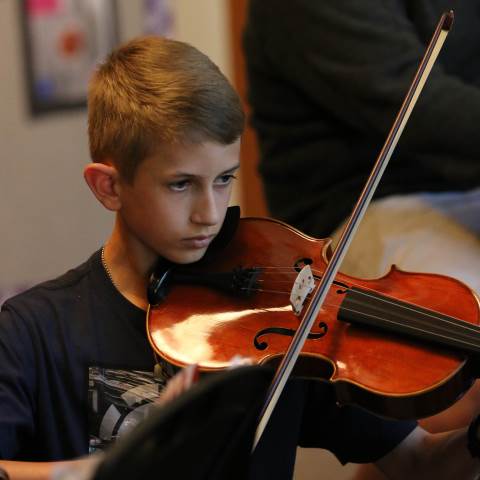

It's what happens behind the scenes during iPeriod, in preparation for Tech Fair, in practice rooms each day during Conservatory time, for 10-15 minutes each night in the lives of our fourth- and fifth-grade Band students. It happens as Mr. Brant Evans prepares for his first Darlington TED Talk, and it happens on our courts and fields on campus around the clock. It has to happen in all these instances to make us better.
So, why practice? … Why not?!
Do we want to get better?
Do we want to have fun making music?
Do we want to have more opportunities?
I've been thinking about seventh-grader Stephanie Hughes this week. She recently won the 7th & 8th Grade Video Production category of Darlington’s Tech Fair, and she won because of practice. Stephanie loves to sing and make music. She practices singing and writing music consistently. And this week, she took that skill that she works tirelessly on and turned it into a truly successful project that told a meaningful story.
Practice, a.k.a. homework, with anything makes us better, and being better makes whatever we like to do more fun and ultimately more exciting and interesting.
The fine arts faculty and I would like to share these 9 Things That Happen When You Practice:
1. You follow through with your contribution to the class.
“When students practice at home, progress in the classroom is accelerated. Practice also fosters a culture of teamwork within the ensemble as students understand that their individual progress impacts the progress of the entire group.” - Mr. Jonathan Broome
2. You challenge yourself.
“Practice isn’t simply about getting better at an instrument. It’s about self-motivation and self-improvement -- pushing the boundaries of your knowledge and physical limitations to their maximum in order to achieve a product that is new and exciting.” - Mr. Ben McVety
3. You learn to hold yourself accountable.
“Practice sheet assignments challenge you to be honest with your practice and the reporting of that practice.” - Mrs. Kim Tunnell
4. You develop work ethic.
“The discipline required to maintain a regular practice schedule leads to a strong work ethic that will make you a better student artistically and academically now and a better employee in the future.” - Mrs. Kimberly Human
5. You learn necessary life skills like focus, organization and critical thinking.
“Although things like new techniques, repertoire, and composers are learned and mastered through practice, more important life skills are nurtured, such as the ability to concentrate on the task at hand and keep a regular schedule; organization; critical-thinking skills; and the ability to follow through on a project that takes time to master. These are necessary life skills that are required to succeed in everyday activities, in high school and beyond.” - Mr. Ben McVety
6. You learn to welcome feedback and reconsider your approach.
“When you know the music for a rehearsal, you can look at a variety of ways to make the music come alive and participate in the creation process, not just have to focus on the notes.” - Mrs. Kim Tunnell
7. You make connections.
“You have the potential to make a connection with something new. Something you don’t know becomes something you know and recognize!” - Mrs. Kim Tunnell
8. You have more opportunities to create and collaborate with others.
“Today’s sacrifice becomes tomorrow’s opportunity!” - Mrs. Jenn Broome
“No matter what the subject is -- whether it's math, soccer or music -- learning requires repetition. That's what practice provides, so that the muscles build memory and strength as well.” - Mrs. Annie Camp
9. You learn empathy.
“Practice prepares students to play or sing together in groups in class, and research shows that these experiences in music lead to a better understanding of empathy for others.” - Mrs. Kim Tunnell
It’s important to note that practice isn’t just important when learning an instrument; it happens in every part of our life when we pursue greatness. You see this in our Portrait of a Darlington Graduate below. That’s why we -- as parents, teachers, and administrators -- need to support the power of practice in all areas of our school.
A Darlington graduate...
Passionately explores learning as a personal responsibility
Cultivates versatility by pursuing multifaceted goals (art, athletics, academics)
Identifies interdisciplinary connections
Transfers knowledge and applies skills from the familiar to the unfamiliar
Seeks and analyzes perspectives from multiple persons and cultures
Creates, collaborates, and effectively communicates with superior oral and written skills
Embraces a challenge, welcomes feedback, and reconsiders an approach
Investigates global interconnectedness and cultivates empathy
Turns empathy into a lifetime of service
Values Honor above Everything
Like anything worthwhile, practice requires sacrifice, but the payoff is priceless.
In music, practice develops your musical skills, and this is a tremendous reward in and of itself. But even more importantly, practice over time develops a sense of personal responsibility, tenacity and creative thinking. These character qualities produce success in life and are marketable, no matter the field!